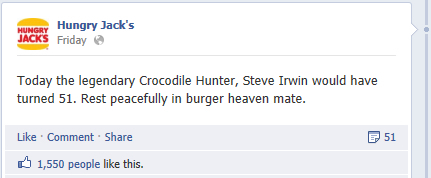On Friday 22 February, popular fast food restaurant Hungry Jack’s (The Australian incarnation of Burger King, for my international friends) posted a Facebook status:

“Today the legendary Crocodile Hunter, Steve Irwin would have turned 51. Rest peacefully in burger heaven mate.”
What exactly has the late animal lover got to with cheeseburgers? What is this “burger heaven”? Why doesn’t it have capital letters? Would Steve Irwin even go to burger heaven? Who’s to say he wouldn’t end up in burger hell? And are the burgers in burger hell still flame-grilled?
Perhaps he wouldn’t be admitted into burger heaven OR hell – Condemned to an eternity in “Burgertory”. Ahh, Burgertory: where the burgers are plain and the service is “okay”.
This is social media marketing: Using current events (or anniversaries of current events) to tie back into your brand, no matter how tenuous the link.
Everyone hates ads. Especially on the Internet. When I’m watching a YouTube video with an ad at the start, my mouse-clicking finger hangs over the “skip” button, waiting impatiently as it counts down from 5 to 0 – which actually takes 7 seconds, if you’ve ever bothered to count it.
Advertising has really invaded social media in the last couple of years. Facebook and Twitter are now awash with spam. And most of it is just lazy. Status updates from major brands can be as vanilla as: “Happy Friday!”
And I know. Because I wrote them.
For a short time, I was one of the faceless men who came up with these updates for companies. Last year I spent seven weeks at a digital advertising agency, writing Facebook and Twitter posts for their big name clients who wanted to sell hairspray and sunscreen and avocado dip.
The problem with social media advertising is most advertisers have absolutely no idea what they’re supposed to do. All of these companies demanded their Tweets and Facebook statuses a month in advance. How are you supposed to make a Tweet topical and interesting if you have to get it approved by middle management 30 days in advance? The best you can do is look at an upcoming anniversary and schedule something about burger heaven.
Hence, most companies just end up posting generic spam about their products – a sentence that will offend no one and bore everyone – effectively junk mail delivered directly to your news feed.
Remember junk mail? It’s really amazing that businesses still persist with print advertising. This is how I deal with it:
https://www.youtube.com/watch?v=F93H10n_JdA&feature=youtu.be
But how do you make advertising work on social media? I don’t know. But I can tell you what people don’t like. People don’t like someone trying to sell them something they don’t want. People don’t like being bothered. People don’t like being asked by a brand of head lice shampoo what they got up to on the weekend.
Businesses are desperate to engage you on social media. There’s an abundance of discounts on offer. Lots of restaurants are now offering free drinks or 20 per cent off your bill, just for using Facebook to “check in” to the restaurant. And even better, most of these restaurants don’t even check to see you’ve done it. So you can get the discounts anyway!
And believe it or not, businesses may still be vying for your online engagement long after you yourself have gone to burger heaven.
A company called LivesOn is due to launch in March. Using complex algorithms and artificial intelligence, they plan to mimic individuals’ Twitter activity to allow you to continue to socialise online after you’ve logged off the server of life.
If your online robot is still posting statuses for you after you’re dead, you can guarantee there’ll be banks and supermarkets and airlines all too eager to keep you up to date on their latest deals.
We may need to develop Blade Runner-esque testing to determine which Twitter accounts are real people and which ones are robots. Who knows, maybe it will be the companies themselves who use LivesOn to continue advertising their products long after the business has died?
Robots selling robots to other robots – this is the future. Do androids Tweet about their dreams of electric sheep? More importantly, do they go to burger heaven?
Burger heaven… wait…
Wouldn’t burger heaven just be full of burgers?
When we say the dog has gone to “Doggy Heaven”, presumably this is a heaven for dogs, right? Not a heaven for the people who eat dogs?
So according to the good people at Hungry Jack’s, the late animal activist Steve Irwin now resides alone, surrounded by either whole or partially eaten, possibly sentient cheeseburgers.
That is absolutely horrifying.
Kind regards,
David M. Green
Happy Wednesday!





